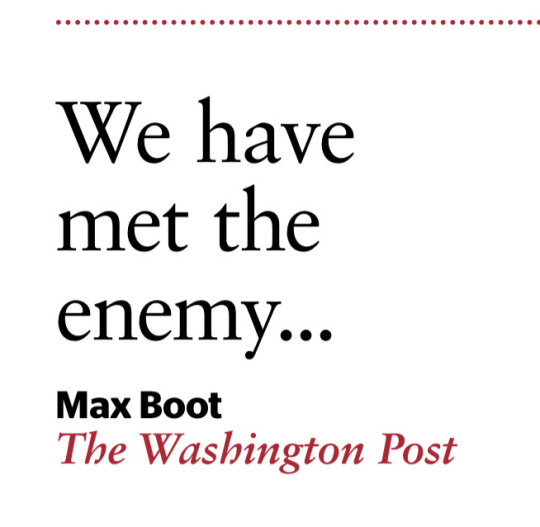#russia's failing economy
Explore tagged Tumblr posts
Text
« [W]hat has long been evident is that Putin’s presidency has been little different from the Soviet era, in that he has made Russia a military giant but an economic dwarf. His gangster state has never been able to diversify; while the world buys Chinese cars and American software, the only thing we buy from Russia is oil, and the gradual turning away from hydrocarbons will eventually expose this as an appalling waste of a country’s potential. »
— Will Dunn at The New Statesman.
What is now tanking Russia is essentially what tanked the Soviet Union – a lopsidedly bad economy. And what barely keeps the sputtering Russian economy from totally collapsing is oil.
So Russia is now a badly run petrostate under the control of a nostalgic dictator who is trying to restore the Soviet Union in all but name – as miserable as that sounds.
One irony of Donald Trump's "drill! drill! drill!" policy (if it actually works) is that it would help undermine Russia's only major source of income.
For the Russian economy, however, Trump represents a looming risk, because however exceptional Putin believes his country to be, Russian prosperity ultimately depends on Western consumers. The reason for this is that Russia runs on oil. With most of its gas exports to Europe stopped by pipeline closures and sanctions, it has become an economy dependent on a single commodity, and while oil prices are high, money flows into the Russian current account. What scares the Russian central bank is the risk of a global financial slowdown that reduces consumer demand around the world, and therefore the price of the oil that is intrinsic to manufacturing and trade. That is exactly the world Trump is promising: a world of de-globalisation and trade barriers.
As I mentioned a few days ago, people in the West need to stop overestimating the strength of Russia. It has a couple of million people involved in its military or military industries, but they are poorly trained and not particularly motivated. Russia may have a lot of weapons, but those are almost always inferior to Western equivalents; many date back to the USSR and are even physically rusty.
At the beginning of this century Russia had the potential to become another Germany in economic terms. It had the talent and adequate infrastructure. But under Putin, Russia has become a parody of the Brezhnev-era USSR – but perhaps even worse. Putin's disaster in Ukraine makes Brezhnev's debacle in Afghanistan seem like a day at the beach. Putin has unintentionally let the world see how pitiful his military is and put on full international display the decrepit nature of Russia's economy.
#russia#vladimir putin#russia's failing economy#hydrocarbons#oil#donald trump#how trump could undermine russia#will dunn#россия#владимир путин#путин хуйло#добей путина#разваливающаяся экономика россии#гангстерская страна#россия проигрывает войну#путин — больший неудачник чем брежнев#путин – это лжедмитрий iv а не пётр великий#нефтяное государство#дональд трамп#руки прочь от украины!#геть з україни#слава україні!#героям слава!
24 notes
·
View notes
Text
America: You Fucked Up
You could have chosen Hope. You chose Hate.
You could have chosen Empathy. You chose Enmity.
You could have chosen a New Beginning. You chose the Nazi.
We could have finally been rid of this cancer on American democracy. He could have been banished to obscurity, remembered only as the worst president in American history, and finally held responsible for his numerous crimes.
The ignorant, racist, misogynistic, white supremacist, pathologicial liar is now going back to the White House. He is a convicted felon, an admitted sexual predator, a total fraud, and a demented old man. He belongs in prison.
What did you do?
You ignored that the U.S. economy is the strongest in the world, that inflation is at its lowest level in four years, that unemployment is at its lowest level in three years. You believed the lies about how terrible the economy is. I knew better.
You forgot about his 30,000+ lies while he was in office. I remember.
You forgot about his complete mismanagement and ignorance over COVID, resulting in the deaths of over one million Americans. I remember.
You forgot about the saber rattling over military exercises in the pacific, when Kim Jong Un threatened us with nuclear missiles, causing us to fear whether we'd see another day. I remember.
You forgot about waking up every morning dreading to hear the latest abomination he tweeted. I remember.
You forgot about "very fine people on both sides." I remember.
You forgot about "only the best people" like Betsy DeVos, Rick Perry, Tom Price, Scott Pruitt, Steve Mnuchin, and many others who were given cabinet positions despite having zero qualifications for the job. I remember.
You forgot that 40 of his former cabinet members and dozens of former generals and officials refused to support him, saying he was "unfit to serve." I remember.
You forgot about January 6, "fight like hell". I remember.
You forgot that when he was told that his vice president was secured because the rioters wanted to kill him, he said, "So what?" I remember
You forgot about The Big Lie, "Release the Kraken" and 60+ failed attempts to overturn the election in the courts. I remember.
You forgot about "I just need you to find 11,780 votes." I remember.
You forgot about "They're eating the cats! They're eating the dogs!" I remember.
What now?
When a woman suffering an ectopic pregnancy dies because she doesn't have access to medical care, that's on you.
When they take away your neighbor, your co-worker, your friend, and deport them, that's on you.
When a woman is forced to suffer the agony of carrying her rapist's baby to term, that's on you.
When a transgender kid harms themselves because they can't get the medical care they need, that's on you.
When your middle-class taxes GO UP, while billionaires get even more tax breaks, that's on you.
When schoolchildren are killed by an assault rifle in a mass shooting, that's on you.
When children grow up ignorant because you banned books and dictated how history is taught, that's on you.
When Grandma can no longer afford a comfortable life because the Social Security she paid into all her working life, and provided income on which she now depends, has been cut, that's on you.
When violence against Jews, Asians, Hispanics rises again, that's on you.
When prices on the goods you buy skyrocket due to tariffs, that's on you.
When Ukraine, deprived of our support, is overrun by Russia, that's on you.
When the U.S. is the laughing stock of the world (as we were 2016-2020), that's on you.
What should you have done?
You should have exercised critical thinking skills, recognized the thousands of lies you were being told, recalled that his administration had four years to live up to his promises and failed at all of them. You should have realized that he is a profoundly stupid individual who doesn't give a shit about you or your family or anything except himself.
You had the last nine years to see that, and you still fell for his bullshit.
1K notes
·
View notes
Text
























My top 24 arts from 2024
Thank you @waaneco and @retrotrait for the tag! I tag @vermutandherring, @kitkat4sims, @kyrylo-kot, @hamsterbellbelle
Year 2024 was kinda busy one for me. I lost my sims OCs due to Sims 4 update, then remade them anew from scratch. Then moved them entirely from Sims 4 to Blender. Then I discovered fbx models of Sherlock and Jon and unlocked completely new level of rendering in eevee. I also started my very first kind of Blender-Sims Story!
It was also a year of constant shelling, missiles, drones, destructions, lockdowns and death reports. Another year of war in Ukraine. During this year north korea joined russia in order to kill more Ukrainians. Durning this year russia used intercontinental ballistic missile against Ukriane. During this year Ukrainians were constantly threatened and manipulated to give up their land, give up their fight and give up their lives so everyone else felt comfortable. Because... russian war is surprisingly uncomfortable. (Well. Go ask russia to stop it, will you?)
And let's not forget that during this year democracy failed. And now we all expect racism, misogyny, homophobia and all possible violation of human rights raising in 2025 in geometric progression. Uh... Also the economy will go down with the same progression.
Yet, despite all this, my silly art is thriving. And guess what. I'm not gonna stop doing it. Despite how much russia or sh*t like MAGA want me dead and silent.
Happy Holidays!
#Wistfulartsims4#the sims 4 art#the sims 4#укртумбочка#український tumblr#український тамблер#sims 4 art#the sims 4 blender#sims 4 blender render#blender eevee#year 2024#ukriane#my sims#frogwares sherlock holmes#sims 4#ts4 art#sims 4 render
167 notes
·
View notes
Text

this a view of someone who's ignored european developments since 2007, opting for a rosy, outdated view of european politics, i.e. the exact type of american committing the exact type of mistake i'm warning about.

to address this point by point: not only has inflation been a global issue, but the US has consistently enjoyed the lowest inflation of any developed economy. american CPI has remained below the british, polish, and eurozone average numbers. european economies have to deal with fallout from the russian invasion of ukraine that the us can ignore: notably, in energy prices, as the US became self-sufficient in energy (and never imported any from russia to begin with, something squeezing the german economy). america is also not hosting millions of ukrainian refugees.
when discussing european instutions—and "europe" in general—one has to be more specific. do you mean the overarching institutions of the EU, criticized for a democratic deficit that many have pinpointed as one source for euro-skepticism and the rise of the far right? the EU Council, widely ignored and headed by charles michel, an incompetent, blatant nepobaby appointment whom everyone grinds their teeth over? the EU parliament, recently filled with a fresh batch of far-right hooligans, which functions more or less as a rubber stamp for the commission? the EU commission itself, headed by VdL, the latest in a string of failed local politician commissioners (who remembers the alcoholic swindler juncker?) masquerading as technocrats? the ECB, which smothers the monetary (and through the maastricht criteria, the fiscal) policy of eurozone members, thereby fueling resentment, far-right movements, and economic disparity? and all of this held hostage by the veto of one orban or fico, —or the german supreme court, when it decides it's had enough with public investment. those institutions, which remain so opaque that even educated americans—and europeans—aren't entirely aware of their function?
or do we mean the institutions of individual countries, ranging from undemocratic autocracies like hungary to the fief of the jupiter king, who called elections in june, lost them, refused to nominate a prime minister from the winning coalition, didn't name any for over a month, and then appointed a rightwing politician from a party that scored dead last, sidestepping his own centrist party? the UK, where sir keir is handing out five years in jail time to climate protesters, raising tuition fees, relying on private investment companies, and through rachel reeves' plan to fix the alleged budget hole left by hunt before further investment, again enacting austerity? this is all front-page headline news from the last half year.
european countries indeed have cheaper healthcare costs, better pensions, and other public goods that the united states does not. when considering "quality of life," remember, however, that most european countries have unemployment rates considered astronomic in america, especially for under-35s:

to focus again and again on european social democracy is to ignore that it has been steadily eroded since the end of the cold war and especially since the great recession by neoliberal political forces that crush the left and open the door for the far right. in the most blatant example, beside's macron's legislative politricks, the IMF-ECB-EC troika cut off euro cash liquidity flow to greece when syriza was trying to undo austerity under varoufakis. the greek collapse consigned a generation to economic failure, killed seniors, and curtailed possibilities for the youth. this erosion happened even in the nordic model, long imagined by americans as nothing short of a utopia:
In part due to the scrapping of wealth and inheritance taxes and a lower corporate tax than both the U.S. and European averages, Sweden has one of the most unequal distributions of wealth in the world today: on a level with Bahrain and Oman, and worse than the United States. Perhaps most dispiriting for Sanders, Sweden also now hosts the highest proportion of billionaires per capita in the world. Many of the country’s trademark social services are now provided by private firms. Its private schools even benefit from the same level of state subsidy as public schools—a voucher system far more radical than anything in the United States and that Democratic politicians would be crucified for advocating. Both here and there, right-leaning commentators in 2020 decried Sanders’s portrait as little more than what Johan Norberg, Swedish author of The Capitalist Manifesto, has called a 1970s “pipedream.” On this, Swedish observers on the left gloomily agree: despite official rhetoric, the “Nordic welfare model” is now more nostalgic myth than reality. (x)
to problematize further, there's an unadressed first world perspective: who's getting the good quality of life, why are the main economies of the EU so wealthy, and how does the EU continue to enrich itself? there are certainly many living outdoors today, drowning in the mediterranean, or dying of exposure in białowieża. fortress europe is a crime against humanity—and it doesn't beat back the far right. it weakens civic and human rights, undermines legal oversight, and criminalizes humanitarian engagement, allowing an authoritarian creep.
you shouldn't understand the political and the historical as a snapshot in time, but as a moving train. this is the state of europe today. all of the above is necessarily a simplification and an abbreviation, but there's a trajectory you can begin to trace out: given all of the above, where do you think europe is headed?
#sorry that the US and Poland are the same shade of pink in the CPI chart i couldn't change it#please stop idealizing europe's political trajectory. it's 2024. you've got to stop.#i'm not trying to insult or condescend the person who left this but to shed light on what are extremely obvious issues mystified#by a decades-old mirage of europe still trapping hordes of well-meaning americans who ought to know better#if tugoslavija were here...
190 notes
·
View notes
Text

The biggest threat to the United States is not China or Russia or other "external threats," said Max Boot. It's "our own political dysfunction." The U.S. remains fundamentally strong, with the world's biggest and most resilient economy, the most powerful military, and 50 allies, compared with a handful for China and Russia. China's once-booming economy has stagnated, due to poor central planning and an aging and shrinking population. We remain the world's only true superpower and an "indispensable nation," keeping rogue actors like Vladimir Putin and Iran in check. But extreme partisan warfare and a growing isolationist movement have put us on the road to abdicating that critical role. A divided Congress cannot even pass a budget, or agree on military aid to embattled allies Israel and Ukraine. If Donald Trump and his "American First" brigade regains the White House, he'll likely abandon Ukraine, pull the U.S. out of NATO, alienate allies, and cripple our nation's global power. A host of enemies, including Nazi Germany, al Qaida, the Soviet Union, Russia, and China have been unable to cripple the U.S. and demote us to second-class status. But Americans may succeed where "others have failed."
THE WEEK November 24, 2023
288 notes
·
View notes
Text
Excerpt from the Substack Distilled:
In the last few months, the Biden administration has quietly passed multiple federal policies that will transform the United States economy and wipe out billions of tons of future greenhouse gas emissions.
The new policies have received little attention outside of wonky climate circles. And that is a problem.
Earlier this year, I wrote that Biden has done more to mitigate climate change than any President before him. For decades, environmentalists tried and failed to convince lawmakers to pass even the most marginal climate policies. It wasn’t until Biden took office that the logjam broke and the climate policies flowed. And yet few American voters are hearing this story in an election year of huge consequence.
It’s been two and a half months since I wrote that article. In that short time, the Biden administration has passed a handful of climate policies that will collectively cut more than 10 billion tons of planet-warming pollution over the next three decades, more than the annual emissions of India, Russia, Japan, South Korea, Canada, Saudi Arabia, and the entire continent of Europe—combined.
One climate policy that flew under the radar recently was the administration's latest energy efficiency rule, unveiled at the beginning of May. The new rules will reduce the amount of energy that water heaters use by encouraging manufacturers to sell models with more efficient heat pump technology. The new regulation is expected to save more energy than any federal regulation in history.
Most people give little thought to how the water in their homes is heated, but water heaters are the second-largest consumer of energy in the average American home and one of the largest sources of climate pollution in the country.
A few days before the administration announced its water heater efficiency rules, the Environmental Protection Agency (EPA) announced another sweeping policy.
According to the new rules, existing coal power plants will need to either shut down or install carbon capture technology capable of removing 90% of their carbon pollution. The policy will also require any new natural gas power plants that provide baseload power—the ones that run throughout the day and night, as opposed to the peaker plants that only run for a small fraction of hours in the year—to install carbon capture technology.
The new power sector rules are effectively a death blow to coal power in America, which has slowly faded over the last two decades but still emits more carbon emissions than almost every country in the world.
The water heater rules and power plant regulations will help the country meet its goal of cutting emissions by 50% by 2030. But impactful as they will be, they weren’t the most important climate policy that the Biden administration passed in the last two months.
That honor goes to the EPA’s tailpipe rules, which are set to transform the auto industry over the next decade.
Today the transportation sector is the largest source of climate pollution in the United States. Within the sector, passenger cars and trucks are the biggest contributors to emissions. While electric vehicle adoption has grown in recent years, America lags behind many other countries in decarbonizing its vehicle stock.
The EPA’s new rules will force automakers to reduce the amount of pollution and carbon emissions that come from their vehicles. The federal policy doesn’t specifically mandate that automakers produce EVs or stop selling gas-powered cars but instead regulates the average carbon emissions per mile of a manufacturer's entire fleet over the next decade. That means automakers can still sell gas-guzzling, carbon-spewing trucks in 2035. They’ll just need to sell a lot more EVs or plug-in hybrids to bring their average fleet emissions down if they do.
Like the power plant rules, the EPA’s new auto regulations are designed to avoid being thrown out by a conservative and hostile Supreme Court.
128 notes
·
View notes
Text
After more than a decade of the largest war in Europe since the Second World War, the West can no longer ignore the fact that the tipping point of the global balance of power lies in Ukraine.
While relentlessly pursuing its genocidal policy to destroy Ukraine as a nation and Ukrainians as a distinct national and ethnic group, Moscow has been pushing an international agenda of a 'new world order’ to replace the Western-led, rules-based system of international relations.
The West’s weak response to Russia’s threat to international peace has catalysed an imploding of the global security order. We are facing an emboldened Sino-Russian alliance which strongly believes there is a window of opportunity to gain the power to set the rules for a new, unfree world, ruled by force.
Russia’s large-scale destruction of Ukraine is tangible evidence of how international peace can crumble in front of our eyes when rogue actors who seek to detonate it demonstrate more determination and resolve than those who purport to defend it. The free world’s demonstrable lack of resolute will to uphold international law is a major factor in the current global crisis and invites further chaos and violence.
This historic moment calls for urgent revision of the current Western course of conspicuously inadequate actions to remove the threat of Russia as the linchpin of the anti-Western, anti-democratic axis. If the world is to avoid a new global conflict, Western policy must be refocused on a full commitment to defending the principles of the liberal rules-based order that is designed to make the world safer.
The Russian Threat
Vladimir Putin’s Russia is not just an existential threat to Ukraine. Russia's aggressive, revanchist regime is the origin point of the international anti-Western axis. Just as at other critical moments in its history, Russia is once again redefining itself through confrontation with the West. Moscow is challenging Western primacy in international relations in order to reclaim its status of global power. For the Kremlin, the freedom to act above and outside the limits and restrictions of international law is the symbol of such supremacy.
For the past two decades, the world has been observing an escalating 'Russia crisis' – the critical threat posed by a criminal, militarised, totalitarian, aggressive, revanchist and genocidal regime to international peace. Rather than countering the growing threat, Western policy has relied on the 'too big to fail’ approach in dealing with Moscow. Consequently, Russia has largely enjoyed protection from the consequences of its criminal actions, and has been able to continue pursuing its nefarious strategic course.
Moscow’s goal is to replace the current liberal, rules-based international system with a ‘new world order’, where the role of the West is notably reduced. This was Vladimir Putin’s message in speeches given in 2014, 2023 and 2024.
In 2014, Putin made a threatening warning which made clear that Russia will have no limits in pursuing this goal:
‘... changes in the world order – and what we are seeing today are events on this scale – have usually been accompanied by, if not global war and conflict, then by chains of intensive local-level conflicts.’
Russia’s hostile ambitions were spelled out formally when, in 2021, Moscow issued an ultimatum to NATO, publicly outlining its far-reaching demands for a dangerous level of influence over the eastern flank of the alliance.
Moscow’s determination to defy the West has been severely underestimated. The quest for a ‘new world order’, driven by the Sino-Russian alliance, is changing global dynamics. In essence, the new Eastern-led order is based on taking advantage of the globalised economy while destroying the liberal rules-based international order. Rogue regimes in Iran, North Korea, Syria, Venezuela and Belarus are being legitimised. The expanding BRICS group is building an alternative economic system of the 'global majority’ to provide shelter from Western sanctions and ensure global political dominance.
To claim domination, the Sino-Russian alliance is committed to:
Advancing an international agenda of creating spheres of influence by instigating conflicts and chaos to fracture global solidarity.
Displacing the universal rules-based order through special bilateral arrangements that advance a global power alignment tilted towards their alliance, with Beijing being the biggest beneficiary.
Reversing humanity’s progress by challenging the universal nature of human rights and political freedoms.
Reducing the global domain of freedom by subverting democracies and by corrupting political and economic establishments to foment authoritarianism.
Diminishing the influence of Western democracies in international relations by subverting international organisations.
The objective of the Sino-Russian strategy is a return to an inherently dangerous and divisive 'might makes right’ reality in international relations. While disguised as a universal order of sovereign and equal states, such a system defies the equal application of international law to exempt the great powers from any restrictions imposed by universal rules.
The new Eastern-led order will privilege major international actors with influence and power to coerce smaller countries. While talking about ‘multipolarity’ and ‘multilateralism’, both Moscow and Beijing share the position of denying smaller countries equal standing in international relations. This essence of the ‘new order’ is illustrated perfectly by the policy of the anti-Western axis towards Ukraine, which promotes and serves Russian interests.
The West’s Self-Defeating Russia Policy
At its core, Western Russia policy – especially since Vladimir Putin’s revanchist speech at the 2007 Munich Security Conference – has been mostly focused on global strategic stability.
The US’s reset of relations with Russia after the latter’s 2008 war on Georgia ushered in a period of a doomed appeasement strategy. Instead of taming Moscow’s aggression by firmly upholding international law, Putin’s quest to satisfy revanchist ‘grievances’ was tolerated. This policy resulted in destructive consequences for the world. An emboldened Kremlin unleashed disinformation, interference, corruption, subversion and violence on a scale which affects the entire trajectory of global affairs.
Russia’s war on Ukraine has been the main point of its attack on international peace and security in its efforts to re-establish global dominance.
From the beginning of Russia’s illegal and unprovoked war of aggression on Ukraine in 2014, the West misdefined this interstate war as a ‘Ukraine crisis’ to diminish the international threat of an aggressive Russia. The horrific images of Moscow’s 2022 large-scale offensive and consequent massacres of Ukrainian civilians forced Western leaders to face the grim reality of the actual ‘Russia crisis’. Now, in 2024, there is finally a growing understanding that Moscow is using its war against Ukraine as a system-changing conflict within a global confrontation driven by the Sino-Russian alliance to bring down the Western-led rules based order.
Despite committing grave violations of international law and undermining world peace, Russia has largely enjoyed protection from the consequences of its criminal actions. At the same time, Ukraine – the victim of Russia’s unprovoked and illegal aggression – has been bound hand and foot in exercising its legal right to self-defence
Russia – a country with nuclear capabilities and an army, territory and economy many times larger than that of Ukraine – continues to be shielded from concerted international action to counteract its genocidal war of aggression, while Ukraine – a country which gave up its nuclear weapons in exchange for security – has been struggling to receive sufficient international support to defend itself against genocide and safeguard international principles that benefit all.
The inept international response to Russia’s war against Ukraine exposes the grotesque design of the international security system. Eight decades on from the Dumbarton Oaks Conference, the peace and security of humanity is still at the mercy of the two totalitarian, genocidal regimes in Moscow and Beijing, and critically depends on the political resolve in three Western capitals – Washington, London and Paris. In Ukraine’s case, the political position in Berlin also bears influence, considering Germany’s important role in the EU and NATO.
Western powers continue to treat Russia as a pillar of the strategic global balance. It is as a direct consequence of this radically flawed approach that Western policy towards Russian aggression has been ultimately premised on Kyiv making concessions to Moscow.
From 2014, Russian interests were accommodated by ever-shifting Western red lines on the invasion; by the position of there being 'no military solution’ to the conflict which invited bolder Russian aggression; by Washington’s ‘leading from behind’ to avoid a more active role in fulfilling its obligations under the Budapest Memorandum; by symbolic sanctions incommensurate with Moscow’s transgressions; by the Berlin- and Paris-mediated ‘peace process’ which implied concessions from Ukraine by design; and by the policy of ‘de-escalation’ which denied military assistance for Ukraine to mount an effective defence.
While Western support for Ukraine has dramatically increased since 2022, when Russia’s role as the aggressor was finally recognised by the UN, the policy approach has remained stuck in the logic that ‘Russia is too big to fail’.
All the major points of Western policy, such as the refusal to deploy NATO troops in Ukraine; the limitations on the use of Western-supplied weapons to strike military targets in Russian territory (and for some, even in Ukraine’s Crimea); and statements like 'Russia cannot win in Ukraine’, ‘we will support Ukraine for as long as it takes’, ‘we must help Ukraine to strengthen its position at the negotiating table’ or ‘Ukraine will be able to join NATO after winning the war’ reflect the underlying reality that Russia’s interests, however illegitimate, play a weighty role in Western decision-making.
Instead of fully committing to helping Kyiv repel Russian aggression, the West chose to pursue 'escalation management’, enabling Moscow to wreak havoc in Ukraine and largely protecting Russia from the war.
The limited support for Ukraine makes clear that the West never truly had a strategy for Russia’s defeat – which would entail complete unconditional withdrawal of Russian military formations from all of Ukraine, the renunciation of Moscow’s territorial claims, justice for war criminals, and reparations. Without Russia’s defeat, there cannot be a Ukrainian victory, only de facto or de jure concessions by Kyiv.
A defeated Russia is an infinitely lesser threat than an undefeated Russia. Sacrificing Ukraine will not solve the problem of the aggressive, revanchist, totalitarian Russian state. If the black hole of Putin’s Russia swallows Ukraine, it will increase its gravitational pull. The West will face the consequences of the new global power re-alignment, consisting first and foremost of Sino-Russian domination in Europe.
In fact, by refusing to shoot down Russian missiles and drones in NATO airspace; by refusing to implement a humanitarian military mission to protect Ukraine’s civilian infrastructure, especially its nuclear power plants; by drip-feeding military aid to Kyiv, withholding critically needed weapons and imposing restrictions on Ukrainian strikes against Russia; by stalling on NATO membership for Ukraine; and by accepting China’s say on the security of Europe, the West – and the US in particular – has already manifestly relinquished its leadership role in international relations.
The self-defeating policy of risk aversion has also severely damaged the credibility of NATO’s own deterrence. NATO is projecting the image of a panic room, not that of an actionable force capable of providing security – even for its own members.
The Cost of Inertia is Rapidly Rising
The alarming lack of resolute political will in Western capitals to uphold the fundamental rules of global security is giving oxygen to Russia’s and its anti-Western allies’ ambition to reshape our world according to their oppressive vision.
The West cannot isolate itself from the outcome of Russia’s war. This is no longer about ‘helping Ukraine’, but about the responsibility of Western governments to their own citizens to ensure a peaceful future.
The West’s obsessive and unjustifiable avoidance of confrontation with Russia in fact increases the risk of direct engagement becoming the only option. For now, while the Ukrainian army maintains high combat readiness, NATO countries can still avoid a direct face-off with Russia by deploying their troops away from the frontline to help Ukraine protect civilian areas and critical infrastructure and deter invasion from Belarus or, potentially, Russia-occupied Transnistria in Moldova if Russia succeeds in subverting the pro-Western course of Chișinău.
With North Korea sending troops to fight Ukraine, the West’s response to Russia’s war is a watershed moment for the future of humanity. Ukrainians shouldn’t be fighting alone to defend the rules-based order. Not fighting alongside Ukraine means helping Russia to achieve its nefarious goals.
If the West fails to defend the universality of the values of freedom and justice in Ukraine, it will eventually find itself in the role of the global ‘minority', while the Sino-Russian alliance will be legitimised as the voice of the ‘global majority’ and proceed to impose its will over the entirety of the international system.
The free world urgently needs leadership from both sides of the Atlantic to safeguard the vision of the rules-based order, where countries are protected from spheres of influence and oppressive domination. Rogue states breaking the foundational rules of global security and peace must face a commensurate response. The world needs united and devoted action to save Ukraine in order to save the world.
84 notes
·
View notes
Text
Ukrainian forces have defended against Russia's full-scale invasion for 1,000 days and continue to demonstrate incredible resilience against Russian aggression. Russia invaded Ukraine on February 24, 2022 under the incorrect assumption that Ukraine would fail to defend itself and that Russian forces would be able to seize Kyiv City and install a pro-Russian proxy government in three days. One thousand days later, Ukrainian forces have successfully pushed Russian forces from their most forward points of advance in Zhytomyr, Kyiv, Chernihiv, Sumy, Kharkiv, Kherson, Poltava, and Mykolaiv oblasts and continue their daily fight to liberate occupied territory in Kharkiv, Luhansk, Donetsk, Zaporizhia, Mykolaiv, and Kherson oblasts and Crimea. Russian forces are currently advancing throughout eastern Ukraine, and Ukrainian officials have recently warned about the possibility of an imminent Russian offensive operation in Zaporizhia Oblast. Russian President Vladimir Putin is simultaneously waging an informational war against the West, Ukraine, and the Russian population aimed at convincing the world that Russian victory is inevitable, and that Ukraine stands no chance. This informational effort is born out of Putin's fear and understanding that sustained Western military, economic, and diplomatic support for Ukraine will turn the tide of the war against Russia.
Russia has accumulated a significant amount of risk and a number of ever-increasing constraints on its warfighting capabilities over the last 1,000 days. Russia began the war with a poorly organized and understaffed military comprised of contract military personnel and limited number of conscripts due to his incorrect assumption that Ukraine would fold and fear that general mobilization could threaten the stability of his regime. Russia largely relied on a combination of volunteer contract servicemembers, mobilized personnel, and irregular formations (such as the Donetsk and Luhansk People's Republic Army Corps [DNR/LNR AC], the Wagner Group, and Russian Volunteer Corps) to wage Putin's war without general mobilization. This system has provided the Kremlin the manpower necessary to support operations so far, but there are mounting indicators that this system is beginning to teeter. Recent Western estimates of Russian manpower losses suggest that Russian forces are currently losing more troops per month than Russia’s ongoing crypto-mobilization efforts can sustain, and open-source evidence indicates that Russia may not be able to sustain its current rate of armored vehicle and tank losses in the medium term as Russia burns through its stockpiles of Soviet-era equipment. The upcoming 2025 year will only increase the manpower and materiel constraints on the Russian military if Russia attempts to sustain its current offensive tempo, and Putin continues to appear averse to such measures given Russian society's growing disinterest in fighting in Russia’s war, the Russian economy’s limitations including a significant labor deficit and high inflation, and continual aversion to bearing the burden of additional wartime costs. Russia cannot maintain its current tempo indefinitely. Putin will likely need to take disruptive and drastic measures - including another involuntary call up of the mobilization reserve - to overcome these growing limitations as the war protracts.
it's been a long and ruinously expensive war, I think something we've often underestimated is how both sides would keep adapting to the evolving conditions
41 notes
·
View notes
Text
Wars do have that "slowly, then all at once" dynamic, and Ukraine seems like they might be approaching it. Russia has just gotten better at war, a problem when they outnumber Ukraine heavily, and the west has been desultory in its support to close that. There are just no more "gaps" to exploit, and Ukraine's mobilization efforts have been halting. To be honest Russia just has an "autocracy" advantage here - they can use far more expansive measures to get boots on the ground, while Ukraine has just failed to muster the political will to get people to fight on the front lines once the shine faded. They have advantages on things like some equipment (drones most notably) but not enough to offset decaying assets now that Russia fixed its defense economy, locked down far more helpful partners in China (and now North Korea, hey), and cut its casualty gaps down by anywhere from 20% to 50%.
Which funnily enough means I am quite unconcerned about this whole "long range missiles" thing. It is a very ineffective weapon - Ukraine has never had the capacity to sincerely threaten at a macro level Russia's logistics network. The idea of "bringing the war home to the enemy" is something, but when you are losing and the enemy knows it it isn't something worthwhile. It isn't the worst negotiating tactic, can give you some extra punch for some minor concessions maybe, but overall it just can't shift things. And since Russia is aware of all that they also don't get anything from shifting things either. They like the status quo, no need to threaten it.
Obviously the Trump admin is the big wildcard but all signs point to "wrap this up". Now of course the biggest barrier to "wrapping this up" has always been Russia, who has not yet indicated a credible willingness to accept any peace deal that leaves a sovereign Ukraine. Maybe with enough territory swaps they will, who knows, but still - is a pretty bleak picture for Ukraine right now.
33 notes
·
View notes
Note
But it is worth noting, of course, that non-college-educated people in the top 20% (such as due to inheritance or such) still voted R, and at higher frequencies.
Right now I feel politically homeless. The Republicans are obviously not an option. I disagree with the progressive Dems on foreign policy, but I disagree with the centrist Dems on economics to a great degree.
Yes, I mean the whole break down of who in what economic group (and then splitting it by race) voted for which party is not cut and dry, I just wanted to express frustration at the idea that if we just were "like FDR" or were progressive or whatever, people would flock to the Democratic banner and we'd win FDR in 1936 style landslides forever and always Aman. Because very clearly Joe Biden modeled himself on FDR or LBJ and did a bunch of very progressive stuff and like... the landslides and overwhelming popularity failed to show up. Its just annoying to see that take over and over when its clearly not true, now, I support all that stuff because I think its good stuff to do, but also lets be realistic its clearly not a vote winner (I don't think its a vote loser as such either)
personally I'm pretty comfortable being politically homeless. In a general sense I'm a Democrat but that really only describes any at least semi-serious person anywhere on the left of center of American politics. I personally believe in American leadership in the world, are we perfect? nope, but history shows us that one country is usually the lead, the agenda setter, the tone setter, the Primus inter pares, etc and if I have to pick between us and the other countries who want to be setting the agenda, what China? the techno-totalitarian state? Russia? thats literally waging a war of genocide as we speak? no thanks I'll take the flawed USA over those two any day. But I'm also progressive, I don't believe in a "little" interference by the state in abortion or trans healthcare I think people should be left alone to make their medical choices with their doctors. I believe in a role for the state in the economy, I believe in strong climate action (thus why American leadership in the world, China and Russia don't want to do shit on climate change) and that more immigration is a good thing.
and honestly I'm okay not fitting neatly into one camp with set answers for all our policy questions. We live in an age where aren't thinking, at all, much less for themselves, everyone spits out slogans with no meat behind them "Make American Great Again" wtf does that mean? "Green New Deal" huh? "Defund The Police" but we don't really mean defund we mean complex explanation followed by someone yelling "yes we do, abolish the cops!" "Free Palestine" "DOGE" "Make America Healthy Again" "raw milk!" "no cops at pride" we're all just yelling CRAP! and no one has any thoughts much less answers. So I'm not worried about fitting into a home, and having like minded people, if I agree with people 100% on everything political, I'm gonna start to get worried. Any political movement has to be big tent, has to involve people who don't agree on everything, doesn't mean you give up on what you believe in, you fight for it in the tent, and sometimes you lose and you sit it out because you don't get anywhere taking your toys and going home, you just keep fighting till you get what you want.
26 notes
·
View notes
Text
Germany Should Have Listened to Trump
Tuesday 2.27.2024 Wall Street Journal
By Walter Russell Mead
Trump was right about Berlin’s self-defense and risky energy dependence on Russia.
The lower house of Germany’s Parliament voted to legalize the recreational use of cannabis last week. It was a timely move. Germany’s leadership class is going to need all the mellow it can find in a world that isn’t going Germany’s way.
Russian advances in Ukraine and American paralysis over the next aid package are reinforcing the reality that Germany needs to defend itself but lacks the power to do so. So are developments in the Red Sea, where German manufacturers must cope with shipping delays as the Biden administration fails to keep the vital waterway clear.
Forget the 2% of gross domestic product that Germany has repeatedly promised and failed to spend on defense. Defense Minister Boris Pistorius shocked many observers this month when he said that in the new world situation, Germany may have to spend as much as 3.5% of GDP for defense.
The economic news is also grim. Last year Germany’s GDP shrank 0.3%, and last week the government slashed 2024 growth estimates to a pitiful 0.2%. Economists expect negative growth during the first quarter of 2024, placing the country in recession. The outlook for housing is bleak, with business confidence reaching all-time lows. The news in manufacturing is little better. This month the widely followed HCOB German Flash Composite Purchasing Managers’ Index fell to 46.1, the eighth month in a row that the index has pointed to decreasing economic activity.
Energy prices are a particular sore spot. The chemical giant BASF announced €1 billion in spending cuts in its German operations, blaming a mix of weak demand in the German market and “structurally higher energy prices.” Enormous U.S. subsidies under the so-called Inflation Reduction Act are leading German companies to look across the Atlantic.
Chinese competition is another massive worry. China long ago passed Germany as the world’s largest car producer. Increasingly, especially in electric vehicles, it is challenging Germany as both a low-cost and high-quality manufacturer. Beijing aims to marginalize German capital goods and automobile companies in China while Chinese exporters challenge German dominance in world markets.
With the associations representing the small and medium-size Mittelstand firms that make up the heart of the German economy warning in a rare joint open letter about Germany’s loss of competitiveness, Economy Minister Robert Habeck isn’t mincing words. The economy is in “rough waters.” The “competitiveness of Germany as an industrial location” is in doubt.
It isn’t all doom and gloom. The outlook for the service sector is brighter than for manufacturing, and as the Journal reported last week, the Ifo Institute’s business-climate index improved slightly this month. The best that can be said for the outlook? “The German economy is stabilizing at a low level,” according to Ifo’s president.
Meanwhile, Germany’s dysfunctional three-party coalition government is paralyzed by internal struggles. The largest party in the coalition, Chancellor Olaf Scholz’s Social Democratic Party (SPD), is deeply divided over foreign policy, with many nostalgic for good relations with Russia and allergic to military spending. The SPD also wants Biden-like government spending initiatives to revive the German industrial machine and expand social benefits. The Greens, the next-largest party, are by German standards foreign-policy hawks but continue to press for a rapid energy transition that drives up costs for business and consumers. The third party in the coalition, the Free Democrats, wants to hold the line on government spending. As if this weren’t enough trouble, the conservative opposition parties have a blocking minority in Parliament’s upper house.
This is not where Germans thought they would be. Sixteen months ago, I visited Berlin and heard from a stream of government officials, think tankers and economists that everything was working fine. Russia was failing in Ukraine. The energy transition would boost German competitiveness and employment. Germany’s Mittelstand would handle anything China could throw at it.
Under the circumstances, it’s no surprise that antiestablishment parties are growing in Germany. The far right Alternative for Germany (AfD) currently has more support than any of the governing parties, with one recent poll showing the AfD at 19%, the Social Democrats at 14%, the Greens at 13%, and the Free Democrats at 4%.
The most bitter pill of all for Germany’s establishment may be the realization that on the most important issues facing Germany, Donald Trump was right where they were wrong. Getting in bed with Vladimir Putin for cheap energy was both foolish and deeply disloyal to the West. German defense policy was self-defeating and dangerous. China wasn’t a reliable partner.
“Ich bin ein Berliner,” was President John F. Kennedy’s message to Germany. If Donald Trump returns to the White House, his message will likely be “Das habe ich gleich gesagt,” or “I told you so.”

#Today's#Wall Street Journal#Trump Was Right About Everything#trump 2024#trump#president trump#repost#donald trump#art#nature#democrats#Biden#Obama#love#Russia#Germany#landscape#fashion#leadership#honest#integrity#guts#energy#GNP#NATO#DIY#GIF#IG#Europe#listen
84 notes
·
View notes
Note
I find the reason people vote for Trump to be ridiculous.
"I will vote for him because he is going to fix the economy!" but his past policies pretty much only benefited the top 1% and economists criticize his 2nd term planned policies, saying they are going to hurt the US economy.
"He will protect liberty!" but what about abortion rights? Is that protecting liberty?
"Better security!" Trump doesn't care about climate change despite the fact it is the biggest threat we face, and he also doesn't want LGBT+ individuals joining the military (fewer soldiers = less military power).
I'm sure there are more. America, please don't vote this buffoon into power again.
All of this! But let's add more to it!
"I will vote for him because he is going to fix the economy!"
One of Trump's big promises is putting massive tariffs on goods from overseas.
This means that any goods that are delivered here are going to be more expensive. Companies will pass this extra cost off onto the consumer.
Whatever people think about inflation now, it will be worse if you make companies pay more to deliver goods to the United States.
"He will protect liberty!"
Also, what about freedom of speech? Trump has threatened to target media organizations that criticize him. He has threatened to shut down pro-Palestinian protesters.
The only freedom of speech that he values is that of people who support him.
"Better security!"
Our biggest geopolitical threat on the world stage today is Russia.
Currently, Russia is hemorrhaging resources in a prolonged war in Ukraine, with Ukraine being supported by other countries providing it with arms and resources to sustain it.
Russia has threatened to use nuclear weapons against us and the rest of the world, and they have allied themselves with North Korea who regularly threatens the same.
If Russia is allowed an easy victory in Ukraine, it is likely that they will next set their sights on NATO allies soon after.
I do not want to downplay the humanitarian aspect to our aid to Ukraine. That morally, it is the right thing to do to help Ukrainians protect themselves against a foreign invader.
But I also think Trump supporters need to understand that there's strategic benefit for the United States to continue to supply Ukraine.
A victory for Ukraine will put an end to Russian expansionism for a long time.
Failing that though, every single year that the war goes on is another year that Russia isn't able to attack NATO. It's another year that their forces are all occupied in a war they expected to be finished in a couple weeks.
Keeping Russia occupied and Ukraine well supplied is in the best interest of the United States.
If Donald Trump is elected, it is likely that he will withdraw all aid from Ukraine. He will give Russia a free pass to do whatever they want.
There's even a good chance that he will withdraw from NATO if Russia attacks NATO countries, leaving us without allies.
Anybody who thinks that Donald Trump can protect us hasn't been paying attention.
#Donald Trump#politics#political#2024 election#elections#Kamala Harris#Trump#Harris#harris for president#vote harris#election#presidential election#United States#usa#USA politics#Russia#Ukraine#Vladimir Putin
23 notes
·
View notes
Note
I heard economic-wise trump was very good president at his time so objectively he's completely bad to US or not
Nope. Trump was not at all good for the economy. That is just false GOP (and probably also Russian bc let's be real, they're the same thing pretty much) propaganda.
There are lots of opinions about whether Democrat or traditional Republican economic policies are better for the US overall. But there is no more traditional Republican party. The GOP is now the party of Trump. And Trump is terrible for the US in every way.
Trump is a weapon being used by Russia to destroy US democracy and impoverish and inflict suffering on the American people. Nothing about him or the MAGA GOP are good for the US.
Here's the US GDP growth rate. Trump was elected in 2016. Biden was elected in 2020. So yeah. Trump's tariffs and protectionism are inflationary and bad for trade and the economy.
And his terrible covid policies were the reason that the US had a massive covid crash (and millions of deaths). Biden was able to clean a lot of that situation for little credit. It makes sense Trump's economic policies are bad - he's failed at every business he ran (somehow even including a casino!!) plus he's just a puppet for Russia and Russia is benefited by the US being weakened with a bad economy and miserable people.

Trump is utterly terrible for the US. He wants to strip away civil rights. He wants to strip away democracy. And yes, he's bad for the economy too.
12 notes
·
View notes
Text
Trump Demands Putin ‘Make a Deal’ on Ukrainian War or Face ‘Taxes, Tariffs, and Sanctions’
President Donald Trump encouraged Russian President Vladimir Putin to “make a deal” and shut down the Ukrainian war or face economic punishment from the United States.
Trump vowed on the campaign trail that he would bring the Ukrainian war to a close after President Joe Biden appeared to only fuel the war with arms and economic aid.
Russia invaded Ukraine after the Biden administration took power. Before the invasion, Russia indicated it was worried about the administration’s inviting overtures for Ukraine to join NATO, a political and military alliance of countries on the doorstep of Russia. It repeatedly claimed any expansion of NATO into Ukraine was a redline.
Biden refused to speak with Putin about a peace deal, as many Ukrainians continued to die in mandatory military service. “For God’s sake, this man cannot remain in power,” Biden said of Putin in off-the-cuff remarks during a speech in 2022.
Trump said in a Truth Social post on Wednesday that he loves the Russian people and has “a very good relationship” with Putin, but demanded the Russian president end the war. If Putin does not, Trump said, the United States would place “taxes, tariffs, and sanctions” on Russia.
Trump wrote:
I’m not looking to hurt Russia. I love the Russian people, and always had a very good relationship with President Putin — and this despite the Radical Left’s Russia, Russia, Russia HOAX. We must never forget that Russia helped us win the Second World War, losing almost 60,000,000 lives in the process. All of that being said, I’m going to do Russia, whose Economy is failing, and President Putin, a very big FAVOR. Settle now, and STOP this ridiculous War!
“IT’S ONLY GOING TO GET WORSE,” Trump said. “If we don’t make a ‘deal,’ and soon, I have no other choice but to put high levels of Taxes, Tariffs, and Sanctions on anything being sold by Russia to the United States, and various other participating countries.”
8 notes
·
View notes
Text
THE TIMES: The Formula One driver and his father, Steve, on failed driving tests and sleeping in horseboxes

George
My earliest memories are of living in a mobile home while my parents built a house in a field in the middle of nowhere, near Wisbech in Cambridgeshire. I rode a pedal tractor around the site, hurtling through corners and reversing with a trailer.
At 25 I am the youngest of three. Cara is 37 and works as my personal assistant. Benjy is 36 and caught the karting bug when he was just 11. He was a brilliant driver, becoming a national and world karting champion. Unfortunately, even starting at such a young age, it was already too late for him to have a professional career. I took up karting when I was six and he helped me a lot. Benjy was like a mentor. He eventually gave up racing at university, so Dad’s focus was on me.
I didn’t see much of Dad during the week. He got up early and came home late running a business selling seeds and pulses. As a kid you miss having your father around, but it’s only now that I appreciate he was doing it so I could race at the weekend. Dad didn’t come from a lot and did well to create a successful business. We weren’t poor but we weren’t wealthy like the families of some F1 racing drivers now.
After long hours at work Dad drove us in a camper van to racetracks around the country. It was very much a family affair. Dad was the mechanic, Mum did the cooking and collected data on my driving. When I drove well, there were celebrations and the mood was great but because everyone was so emotionally and financially invested, when I suffered a poor weekend the mood was bad.
Dad has always been hard on the ones he loves. As a young kid, that was difficult to deal with. The pressure didn’t just filter down to me, it affected the whole family. I felt the weight of failure and expectation. If I made a silly mistake and spun off the track, I can now understand why Dad might have thought, “What the hell am I doing this for?” He had to work his arse off to support my racing, so if I didn’t put in enough effort, it must have been hard.

I now live in the world of F1, where tens of millions of pounds are spoken about like peanuts. Even in Formula Two or Three, every driver has to find huge amounts of money to get on the grid — it’s just crazy. When I was 16 and moving up through the ranks, I realised Dad didn’t have that sort of capital. I thought, “Oh shit, if I can’t find that sort of sponsorship or get picked by a team, my F1 dream is gone.”
Winning the F2 championship in 2018 was a big moment but I’ll never forget the day I signed for Williams F1 in September 2018. I was racing in F2 in Sochi, Russia, when Claire Williams, the deputy team principal at the time, called me in and offered a deal. Mum and Dad were the first people I told and they both cried. I told them to save their tears for when I won a race.
I joined Mercedes for the 2022 season, alongside Lewis Hamilton. It was a huge opportunity for me to learn and grow in F1, as well as show what I’m capable of. It was not an easy season for Mercedes but I feel very fortunate to be in this position, plus Lewis is such an incredible bloke on and off the track. He is so experienced, whereas I’m a 25-year-old who is just totally focused on trying to be the best F1 driver I can be. I’m pretty inspired by what he has achieved.
Dad is a strong character but he has become more emotional since his children have left home. He’s also friendlier now and doesn’t mind making a fool of himself from time to time. My only regret is that F1 doesn’t leave much free space to see each other but we do speak on the phone all the time.
Of course he still watches the pennies and will only fly economy — he won’t let me pay for their flights either. I know my parents can afford to fly business but it’s the principle for them. I want to make sure I reach a position with my racing where I can afford to give them the best in their retirement. They totally deserve it.

Steve
The F1 guys are OK on the racetrack but they are never as good as their dads on normal roads. George is always telling me to slow down as we approach a junction, though his mum thinks it’s fantastic when he takes her out and drives quickly.
There was just one occasion when George didn’t put the full effort in and it caused quite a commotion. He failed his first driving test at 17 because he thought that being a great driver on the track was good enough. He came home fuming that the examiner was wrong. We had to go back to the test centre in King’s Lynn so George could confront him. That didn’t go down well.
George was a cheeky little boy, a bit of a comedian. I worked a lot but it’s strange that I can only remember the racing side of his life, not watching him grow up at home. We enjoyed a nice life but had to work hard for it. I came from a family of farm workers with very little money and wanted to get away from agriculture and better myself but I ended up owning a wholesale seed business.
My wife, Alison, and I knew George was going to be a racing driver at the age of two. He was born on the track, coming to races to watch his brother and help out in the garage. He had a toy tractor that he rode around the pit lane and collected stickers from each race to stick on his “George Russell Racing” tractor.
As George progressed through the racing ranks it became more and more expensive. We invested in a motorhome to travel to races — before that I would sometimes sleep in a freezing horsebox. There were sacrifices. Alison and I didn’t go on our first holiday together until two years ago, on a trip to Lanzarote. By then we had been together for 38 years. People think that now George is in F1 we hang out with Lewis Hamilton and Toto Wolff, the Mercedes principal, every weekend in the sunshine, but it couldn’t be further from the truth. Now Alison and I rarely go to races because we don’t want to interfere.
It was hard letting George fly the nest because we had been a close family, always doing our racing together. He is methodical and organised but his feet are firmly on the ground. There are plenty of people in the family to put him straight if needed.
There’s no magic wand to become an F1 driver — it takes hard work and dedication. It was only when I stood on the track with George before his first grand prix that I looked up at the enormous crowd and thought, “Oh my God, we’ve actually got here.”
309 notes
·
View notes
Text
The ANC’s long track record of political mistakes and policy failures is finally catching up to it precisely at the moment when the party finally started prioritizing South Africa’s participation in global processes, thus creating the pretext for the US to meddle in this BRICS member’s affairs.
Trump signed an Executive Order late last week “Addressing Egregious Actions Of The Republic Of South Africa” that mandated cutting off aid to the country as punishment for its new contentious Expropriation Act and promoting the resettlement of the white minority (Afrikaners) to the US. Supporters applauded him for giving attention to what they consider to be the long-ignored issue of black-on-white racially discriminatory policies while opponents believe that it’s a racist move promulgated on false pretexts.
Before proceeding, readers might want to review some of RT’s reports about the Afrikaner farmer (Boer) issue, South Africa’s ruling African National Congress (ANC), and the country’s economic challenges:
* 19 March 2009: “The Boer War and the Russo-Japanese War”
* 25 October 2013: “S. Africa evacuation plan: White Afrikaner group fears genocide upon Mandela’s death”
* 1 May 2018: “Why South Africa's govt plans to strip land from white farmers”
* 15 June 2018: “Calls to ‘kill the Boer’ make all farmers targets, not just whites – South African official”
* 9 July 2018: “‘A matter of life & death’: 15,000 white South African farmers seek refuge in Russia, report says”
* 19 July 2018: “‘They want us all to leave’: South African farmer wants to move to Russia, change name to Ivan”
20 July 2018: “First 50 families of farmers from South Africa may soon resettle in Russia”
* 4 August 2018: “South African farmers seek refuge in Russia’s Crimea”
* 28 February 2019: “South Africa’s ANC needs just 5 years ‘to destroy the economy & the country,’ economist warns”
* 17 April 2019: “South Africa’s economic & social decline the worst of nations not at war”
* 18 April 2019: “‘Don't ever vote for white person’: South African ANC leader's race-based call discussed on RT”
* 11 May 2019: “As it re-elects hopeless ANC again, do we finally admit that post-apartheid South Africa has failed?”
* 4 April 2020: “‘White monopoly capital’: Anti-white South African radicals scorn massive donations that could help black businesses”
* 16 October 2020: “White farmer’s brutal murder sends protesters & counter-protesters to rally outside courthouse in South Africa”
To oversimplify, the brutal murder of some Boers on their farms led to some Afrikaners suspecting that the ANC turns a blind eye to this and even encourages it, while the ANC believes that the Afrikaners’ outsized control over national wealth is an injustice that must be rectified via redistribution. The Expropriation Act’s recent passing came amidst the country’s continued economic challenges, ergo why some of the Afrikaners consider it a distraction while the ANC insists that it’s a long-overdue solution.
7 notes
·
View notes